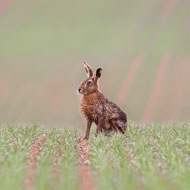Hare coursing gangs ‘will stop at nothing’, police say

Using dogs to chase hares for sport is illegal under the Hunting Act 2004 and the Game Act 1831.
Cambridgeshire Police are urging the public to be vigilant for hare coursers, with one sergeant saying gangs ‘will stop at nothing’ to carry out their pursuits.
In an online blog, Sergeant Andy Street said hare coursing gangs often come from various parts of the country. As well as the obvious animal cruelty issues, they frequently ‘drive across fields of newly set crops, causing thousands of pounds worth of damage and threatening anyone that challenges them,’ he explained.
Using dogs to chase hares for sport is illegal under the Hunting Act 2004 and the Game Act 1831, yet it is one of the local issues that police received most calls about during autumn and winter.
Sergeant Street said he has even ‘known of cases where the coursers have driven straight through the farmyard to get onto a field and when asked not to do so have responded with threats of violence, some have even threatened to burn down the farmer’s home.’
Cambridgeshire Police set up the Rural Crime Action Team (RCAT) to help tackle this issue as well as other rural crime, but Sergeant Street emphasised that they are only a small team covering the entire county. Often, calls are attended by local officers that are ‘not always best equipped to deal with the problem’.
‘The coursers are always in 4x4s and it’s difficult to catch them on fields and muddy droves when driving a front wheel drive patrol car,’ he added. ‘This is why we have to work together and we need you the public to be vigilant. If you see this taking place please call the police. Note down registration numbers and descriptions of vehicles.’
Sharing such intelligence gives the police an ‘early warning system of what and who to look out for’. The RCAT are pursuing civil court injunctions, to stop known offenders from going to the county at all, and giving police greater powers to deal with them when they do.



 The Federation of Independent Veterinary Practices (FIVP) has announced a third season of its podcast, Practice Matters.
The Federation of Independent Veterinary Practices (FIVP) has announced a third season of its podcast, Practice Matters.